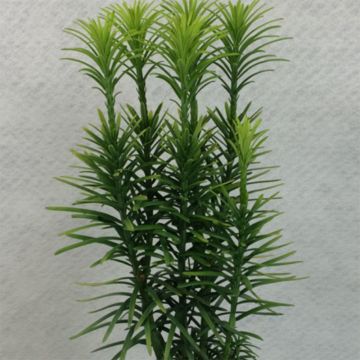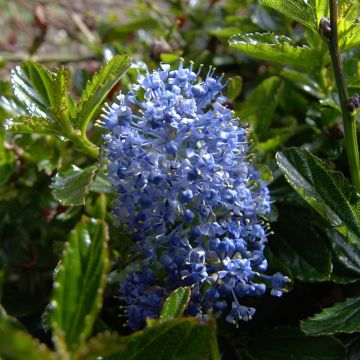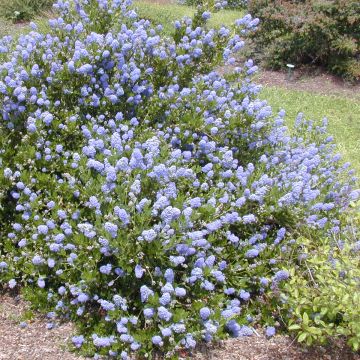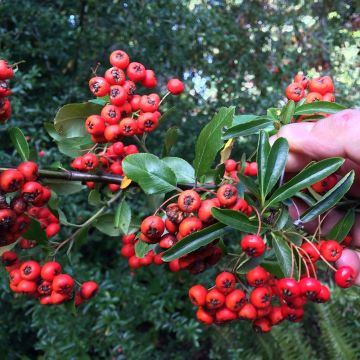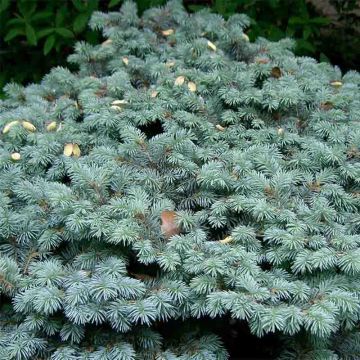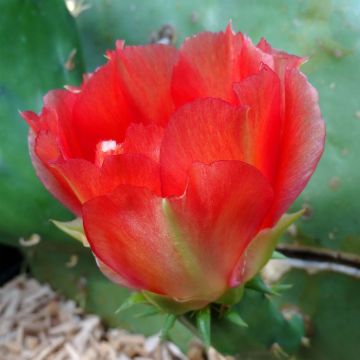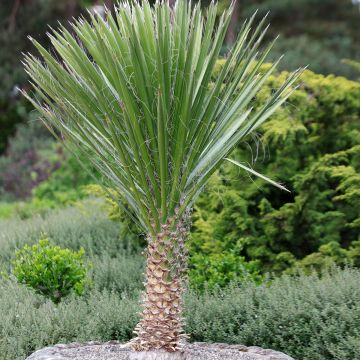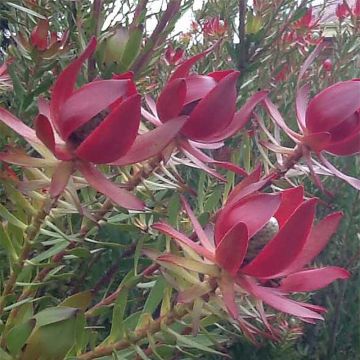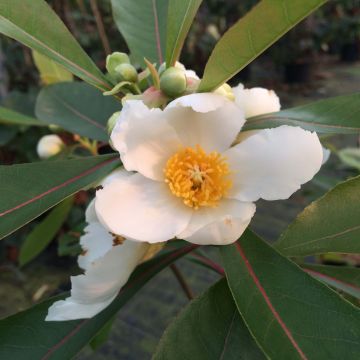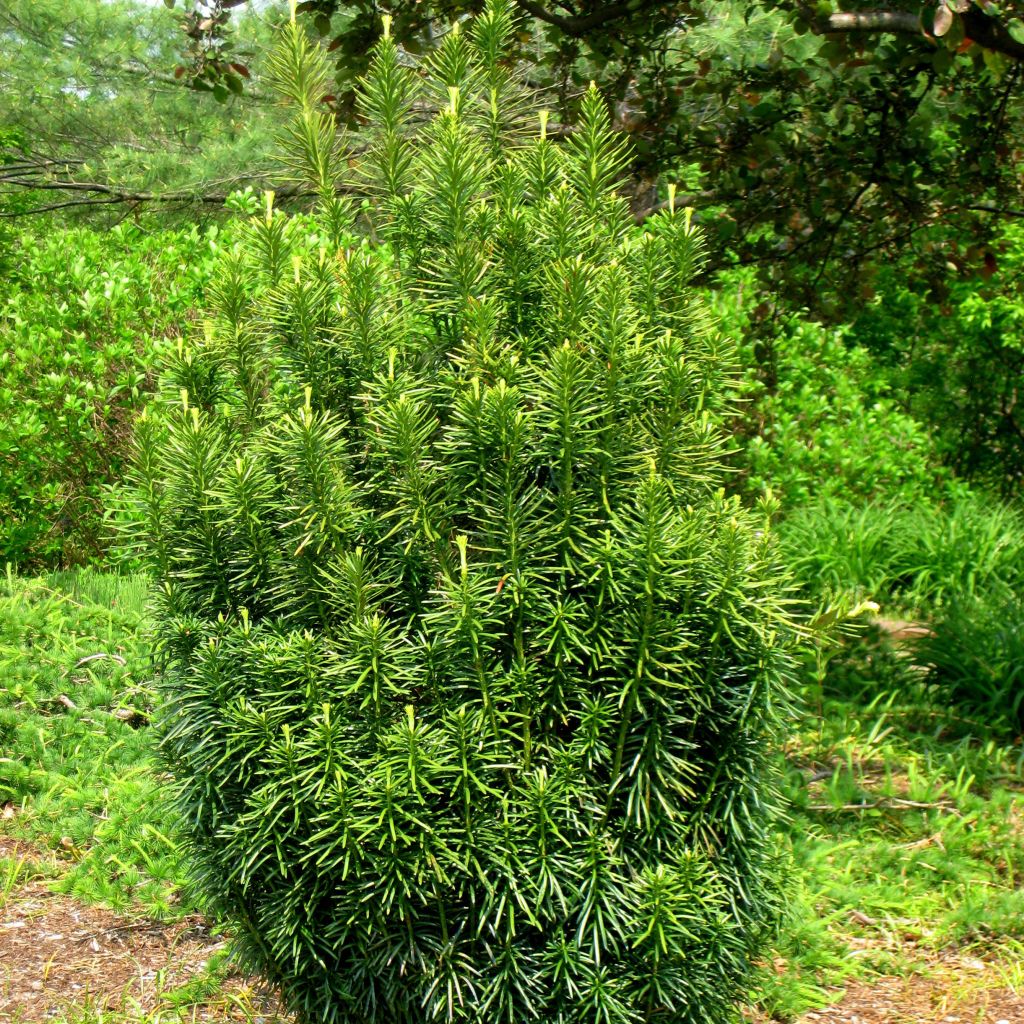

Cephalotaxus harringtonia Fastigiata
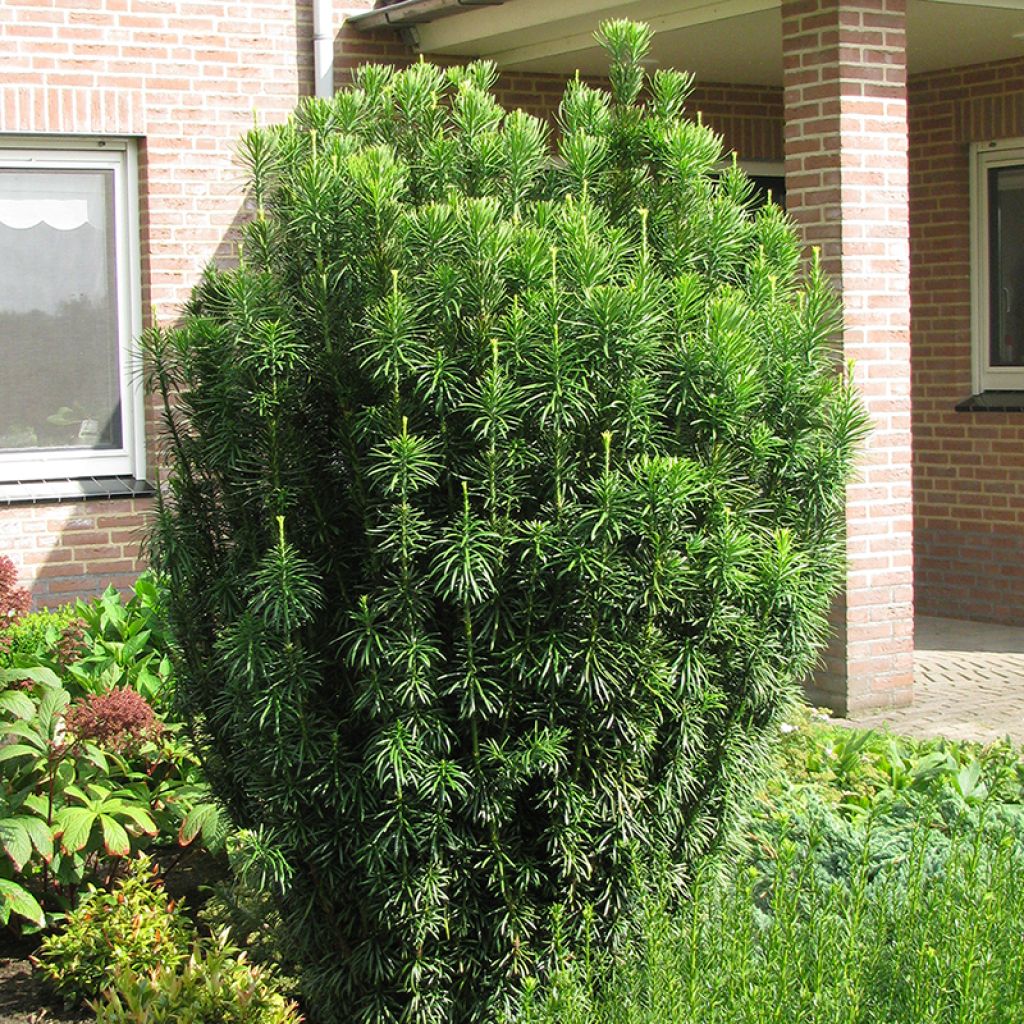

Cephalotaxus harringtonia Fastigiata
Cephalotaxus harringtonia Fastigiata
Cephalotaxus harringtonia Fastigiata
Harrington's Yew, Korean Plum Yew, Japanese Plum Yew
How can I tell if the cephalotaxus harringtonia fastigiata vine-plant that I received and planted is a male or a female young plant? I would like to have fruits, so I need to purchase a second one, taking into account its gender. It looks very beautiful!
Cécile, 27/11/2022
Special offer!
Receive a €20 voucher for any order over €90 (excluding delivery costs, credit notes, and plastic-free options)!
1- Add your favorite plants to your cart.
2- Once you have reached €90, confirm your order (you can even choose the delivery date!).
3- As soon as your order is shipped, you will receive an email containing your voucher code, valid for 3 months (90 days).
Your voucher is unique and can only be used once, for any order with a minimum value of €20, excluding delivery costs.
Can be combined with other current offers, non-divisible and non-refundable.
Home or relay delivery (depending on size and destination)
Schedule delivery date,
and select date in basket
This plant carries a 24 months recovery warranty
More information
We guarantee the quality of our plants for a full growing cycle, and will replace at our expense any plant that fails to recover under normal climatic and planting conditions.

Would this plant suit my garden?
Set up your Plantfit profile →
Description
Cephalotaxus harringtonia 'Fastigiata', also known as Japanese cowtail pine, has a characteristic silhouette, particularly elegant and graphic. It forms a small, stout, dark tree with a slightly flared column, and very erect branches. It is a modest-sized conifer, covered with foliage very similar to that of a yew. It produces ovoid, fleshy, green fruits that turn brown when ripe. Hardy and slow-growing, this vigorous and resistant variety appreciates moist soils and tolerates limestone. This accommodating Cephalotaxus is remarkable at the back of a bed, in a large rock garden, or isolated on a short grass meadow.
Cephalotaxus harringtonia, sometimes called Japanese pine or Japanese plum yew, is a conifer in the family Cephalotaxaceae native to Korea, Japan, and certain regions of China. In nature, this species reaches a height of barely 6 metres (20 feet) and a spread of 1.50 metres (5 feet), forming a bush that is wider at the top of the crown than at the base of the branches.
The cultivar 'Fastigiata' is a particularly elegant form of this species. It has a columnar habit with a slight flare, reaching 1.50 metres (5 feet) in height and 80cm (32in) in spread after 10 years of cultivation, and up to 2 metres (7 feet) in height after many years. It produces many upward-directed branches with disordered branching at the base, unbranched at their tips. They are covered with tough, light green needles for three years, then very dark green, resembling those of yews (Taxus) a lot. They measure 3 to 5cm (1 to 2in) in length, are recurved and arranged in a 'V' shape. They are distributed in two rows on either side of the branches. The undersides of the needles have two very wide silvery stomatal bands. Pretty fleshy fruits appear on the female plants in May and June. They are not very visible and resemble pale green olives, which turn a browner colour in November as they ripen. The male plants, on the other hand, produce small pale yellow sacs filled with pollen in spring. Over time, its bark becomes dark reddish-brown and peels off in scales.
The fastigiate Cephalotaxus is ideal for creating a backdrop in the rear of a bed, or planted as a specimen. The true graphic qualities of dwarf conifers naturally impose themselves in the composition of a contemporary garden, which prefers the aesthetics of silhouettes and textures to that of flowers. These plants, with their strong personalities, structurally define a bed for a long time, mark pathways, border terraces, easily replacing the strong presence of trimmed boxwood. They provide a setting for small roses, peonies, or unruly grasses with very complementary temperaments. They can also be associated with shrubs or ground cover plants such as aubrietas, Cerastiums, as well as flowering shrubs. The key is to play with volumes and colours.
Report an error about the product description
Cephalotaxus harringtonia Fastigiata in pictures
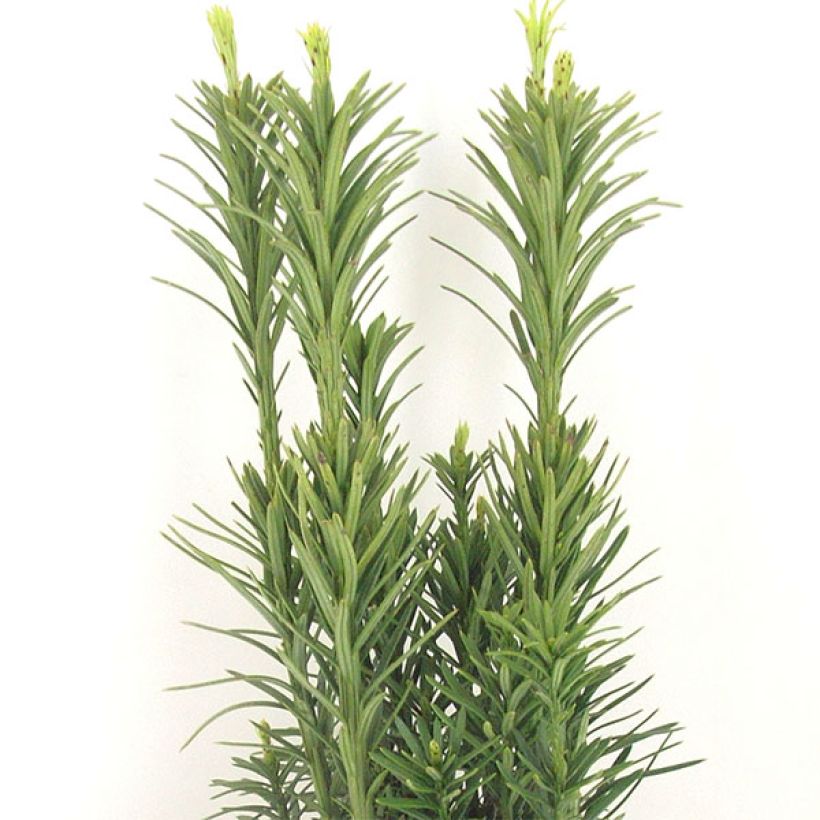

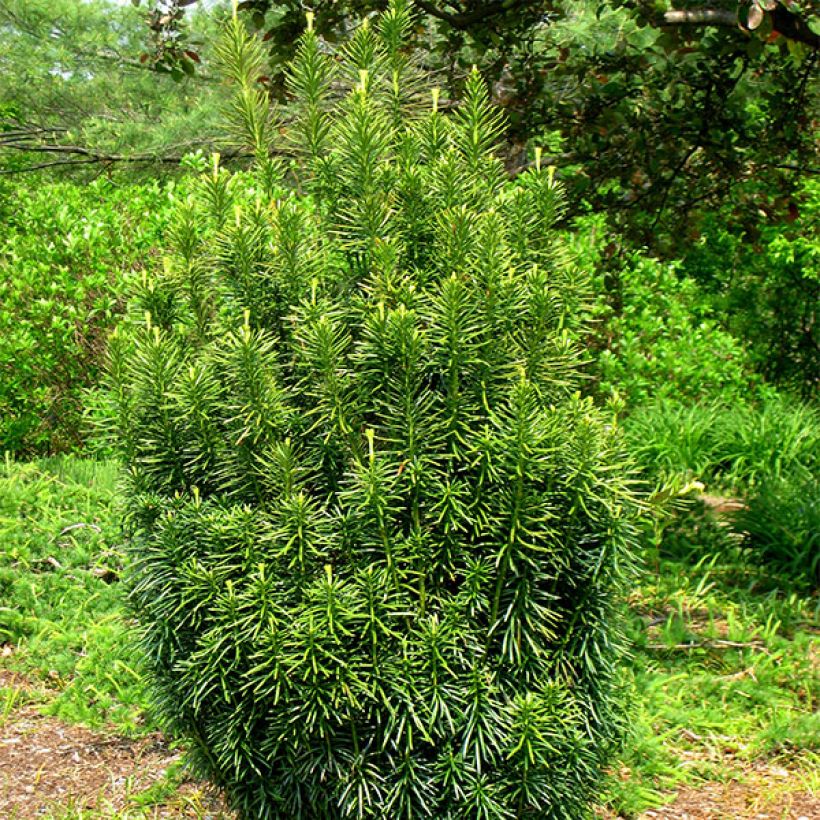

Plant habit
Flowering
Foliage
Safety measures
Botanical data
Cephalotaxus
harringtonia
Fastigiata
Cephalotaxaceae
Harrington's Yew, Korean Plum Yew, Japanese Plum Yew
Cultivar or hybrid
atteinterespiratoire
Cette plante peut entraîner des symptômes allergiques.
Evitez de la planter si vous ou vos proches souffrez de rhinite saisonnière ("rhume des foins").
Davantage d'informations sur https://plantes-risque.info
Other Cephalotaxus
View all →Planting and care
Cephalotaxus harringtonia 'Fastigiata' is planted in spring or autumn, in a soil that retains moisture, rich in humus, slightly acidic, neutral or even calcareous. This conifer thrives in full sun or partial shade. Regularly water the young plants during the months following planting. The plum yew is tolerant of soil type, which can be clayey or sandy, and can withstand short periods of drought. It is a species suited to cool, oceanic or montane climates. This bush does not require pruning, but any unsightly or obstructive branches can be removed to enhance its unique habit.
Planting period
Intended location
Care
-
, onOrder confirmed
Reply from on Promesse de fleurs
Similar products
Haven't found what you were looking for?
Hardiness is the lowest winter temperature a plant can endure without suffering serious damage or even dying. However, hardiness is affected by location (a sheltered area, such as a patio), protection (winter cover) and soil type (hardiness is improved by well-drained soil).

Photo Sharing Terms & Conditions
In order to encourage gardeners to interact and share their experiences, Promesse de fleurs offers various media enabling content to be uploaded onto its Site - in particular via the ‘Photo sharing’ module.
The User agrees to refrain from:
- Posting any content that is illegal, prejudicial, insulting, racist, inciteful to hatred, revisionist, contrary to public decency, that infringes on privacy or on the privacy rights of third parties, in particular the publicity rights of persons and goods, intellectual property rights, or the right to privacy.
- Submitting content on behalf of a third party;
- Impersonate the identity of a third party and/or publish any personal information about a third party;
In general, the User undertakes to refrain from any unethical behaviour.
All Content (in particular text, comments, files, images, photos, videos, creative works, etc.), which may be subject to property or intellectual property rights, image or other private rights, shall remain the property of the User, subject to the limited rights granted by the terms of the licence granted by Promesse de fleurs as stated below. Users are at liberty to publish or not to publish such Content on the Site, notably via the ‘Photo Sharing’ facility, and accept that this Content shall be made public and freely accessible, notably on the Internet.
Users further acknowledge, undertake to have ,and guarantee that they hold all necessary rights and permissions to publish such material on the Site, in particular with regard to the legislation in force pertaining to any privacy, property, intellectual property, image, or contractual rights, or rights of any other nature. By publishing such Content on the Site, Users acknowledge accepting full liability as publishers of the Content within the meaning of the law, and grant Promesse de fleurs, free of charge, an inclusive, worldwide licence for the said Content for the entire duration of its publication, including all reproduction, representation, up/downloading, displaying, performing, transmission, and storage rights.
Users also grant permission for their name to be linked to the Content and accept that this link may not always be made available.
By engaging in posting material, Users consent to their Content becoming automatically accessible on the Internet, in particular on other sites and/or blogs and/or web pages of the Promesse de fleurs site, including in particular social pages and the Promesse de fleurs catalogue.
Users may secure the removal of entrusted content free of charge by issuing a simple request via our contact form.
The flowering period indicated on our website applies to countries and regions located in USDA zone 8 (France, the United Kingdom, Ireland, the Netherlands, etc.)
It will vary according to where you live:
- In zones 9 to 10 (Italy, Spain, Greece, etc.), flowering will occur about 2 to 4 weeks earlier.
- In zones 6 to 7 (Germany, Poland, Slovenia, and lower mountainous regions), flowering will be delayed by 2 to 3 weeks.
- In zone 5 (Central Europe, Scandinavia), blooming will be delayed by 3 to 5 weeks.
In temperate climates, pruning of spring-flowering shrubs (forsythia, spireas, etc.) should be done just after flowering.
Pruning of summer-flowering shrubs (Indian Lilac, Perovskia, etc.) can be done in winter or spring.
In cold regions as well as with frost-sensitive plants, avoid pruning too early when severe frosts may still occur.
The planting period indicated on our website applies to countries and regions located in USDA zone 8 (France, United Kingdom, Ireland, Netherlands).
It will vary according to where you live:
- In Mediterranean zones (Marseille, Madrid, Milan, etc.), autumn and winter are the best planting periods.
- In continental zones (Strasbourg, Munich, Vienna, etc.), delay planting by 2 to 3 weeks in spring and bring it forward by 2 to 4 weeks in autumn.
- In mountainous regions (the Alps, Pyrenees, Carpathians, etc.), it is best to plant in late spring (May-June) or late summer (August-September).
The harvesting period indicated on our website applies to countries and regions in USDA zone 8 (France, England, Ireland, the Netherlands).
In colder areas (Scandinavia, Poland, Austria...) fruit and vegetable harvests are likely to be delayed by 3-4 weeks.
In warmer areas (Italy, Spain, Greece, etc.), harvesting will probably take place earlier, depending on weather conditions.
The sowing periods indicated on our website apply to countries and regions within USDA Zone 8 (France, UK, Ireland, Netherlands).
In colder areas (Scandinavia, Poland, Austria...), delay any outdoor sowing by 3-4 weeks, or sow under glass.
In warmer climes (Italy, Spain, Greece, etc.), bring outdoor sowing forward by a few weeks.






























